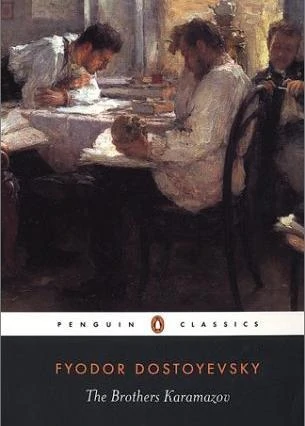Review: The Brothers Karamazov by Fyodor Dostoyevsky

To be of a Karamazovian nature is to be able to contemplate both abysses at once, that of the loftiest and most noble abyss above us and that of the one beneath us, the lowest and foulest of human degradation and thought.
Our protagonist Dimitri is tormented by a triumverate, of his fiance to whom he is engaged but does not love, of his mistress who fiddles with his heart and plays a love song with the chords of economics and of his debaucherous father witholding his due inheritance and lusting for his son’s lover as well. Dimitri must secure his inheritance to elope with his mistress all the while remaining noble to the one he is engaged to. What would be the right thing to do when even the noblest of options is stained, should Dimitri choose to be a scoundrel or should he be a thief? These are the abysses that plague our protagonist. Dimitri is the victim of circumstance.
I’m a Karamazov… when I fall into the abyss, I go straight into it, head down and heels up, and I’m even pleased that I’m falling in such a humiliating position, but let me also kiss the hem of that garment in which my God is clothed; I feel a joy without which the world cannot stand and be.
- Dimitri Karamazov
The book however is not just a story of Dimitri, it is an exposition of the depths of the human condition; on freewill and its consequences. Indeed what decisions can Dimitri come to when the options themselves are not of his provenance, is there no freewill when life is often governed by the dictates of urges?
Dostoyevsky drives deeper into this theme through Dimitri’s brother Ivan, who is of a Faustian nature, with some of the most darkest ideas on governance, religion, morality and life. Ivan’s ideas are like blight and leave him too as a victim of thought. These ideas do not spare the reader either and leaves one with sombre contemplation. His inner story of The Grand Inquisitor is one of the most profound ideas of human society I have come across.
“Nothing has ever been more insupportable for a man and a human society than freedom.”
- The Inquisitor
The youngest of the brothers is Alexei, an affable yet staunch believer of the Eastern Church. Alexei’s torments are almost maternal, he has deep love for his brothers and is a pedestrian in the course of their destiny. In Alexei, Dostoyevsky gives us the comforting narrative of the traditionalists, of God, of the alleviating role religion plays in the absurd nature of existence.
“This is my last message to you: in sorrow, seek happiness.”
- The Elder Zosima
Despite his neutral stance, Alexei is as much a Karamazov as the rest and is capable of contemplating both the abysses. Can Alexei influence the destiny of his brothers?
Dostoyevsky brilliantly congeals these disparate philosophical outlooks of the Karamazov brothers with a narrative that is wrought out by the personalities in the book and their circumstances. He effortlessly makes you despise, loathe, understand, forgive, root and love the same character. At moments, the circumstances of a character are distressing enough to jerk a couple of tears, and these circumstances are rife around us. This is a book that stays in you, and as one of the characters in the book says - “We are all Karamazovian”. It is sure to open a new dimension of understanding in the reader.
Although this is my first full reading of The Brothers Karamazov, I believe there are two ways and two times of reading this book. The first way is as a story about Dimitri and his travails of seeking deliverance, the second way is as a treatise on Human Psychology, and probably the most profound one you could find. The first time is during the age of innocence, when life is still full of possibilities and meaning, when aspirations seem as a matter of effort and not a matter of probabilities. The second time is during the age of resignation. I believe I will read this again.